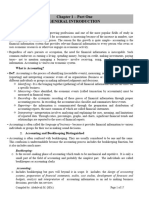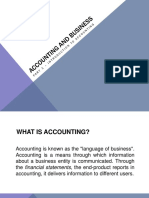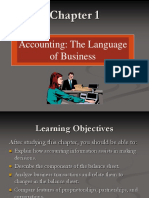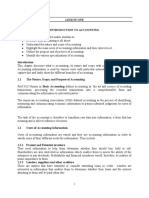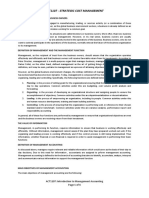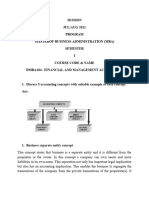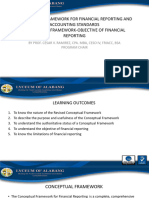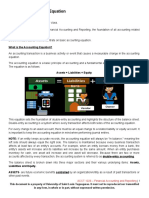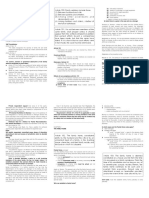Nature of Accounting: Lesson 1: The Need For Financial Reporting
Nature of Accounting: Lesson 1: The Need For Financial Reporting
Uploaded by
Jannyfaye RallecaCopyright:
Available Formats
Nature of Accounting: Lesson 1: The Need For Financial Reporting
Nature of Accounting: Lesson 1: The Need For Financial Reporting
Uploaded by
Jannyfaye RallecaOriginal Title
Copyright
Available Formats
Share this document
Did you find this document useful?
Is this content inappropriate?
Copyright:
Available Formats
Nature of Accounting: Lesson 1: The Need For Financial Reporting
Nature of Accounting: Lesson 1: The Need For Financial Reporting
Uploaded by
Jannyfaye RallecaCopyright:
Available Formats
• Decisions to change certain business
strategies
Lesson 1: The Need for • Decisions on granting remunerations for
Financial Reporting employees
Information in business is vital for it to Also, these users of financial information have
survive. These pieces of information need to be READY ACCESS to the specific things they would
synthesize in order for it to be used in decision like to know. Because of their actual involvement in
making. And because we are in a dynamic society, the operations of the business, these users of
the users of the business information need it to be financial information require information to be tailor-
up-to-date and relevant. Now, let’s look into the fitted to their specific needs, thus the most suitable
nature of accounting information and the different branch of accounting for them is MANAGERIAL
users of financial information. ACCOUNTING. The following are examples of
INTERNAL USERS OF FINANCIAL
INFORMATION.
Nature of Accounting
Accounting is the systematic recording of
financial transactions and presentation of the
related information of the appropriate persons.
Also, it is identified as a process as it performs the
specific task of collecting, processing and
communicating financial information. In doing so, it
follows some definite steps like collection of data
recording, classification summarization, finalization
and reporting. The ultimate purpose of the
accounting process is to generate GENERAL
PURPOSE FINANCIAL STATEMENTS about the
economic transactions of a business. When
accountants are going to communicate these
financial statements, it is called FINANCIAL
REPORTING. The purpose of which is to provide
relevant and timely financial information to the
stakeholders of the business.
Users of Accounting Information
To appreciate well the different users of On the other hand, there are users of
financial information, we are going to classify them accounting information that do not have ready
whether they are EXTERNAL OR INTERNAL access to the financial reports of the business.
users. They rely heavily on the different regulatory
reportorial requirements that they can get from
business. They are called EXTERNAL USERS. The
Internal users use financial information for
general-purpose reports that these users get are
internal decision-making, meaning they use the
called FINANCIAL STATEMENTS which are end
information to evaluate the entity’s performance,
product of a broad branch of accounting called
prepare different financial plans and implement
FINANCIAL ACCOUNTING. We are going to
business decisions. The following are some
discuss the different types of financial statements
examples of where internal users apply accounting
and how are they prepared as we go on through
information:
this course.
• Decisions to borrow funds
External users of financial information have
diversified needs. Some of them include:
ACCT 1013 – Conceptual Framework and Accounting Standards | 1
This document is a property of University of Saint Louis Tuguegarao. It must not be reproduced nor transmitted
in any form, in whole or in part, without expressed written permission.
direct interest use financial information to protect
1. How are businesses act as stewards of their own interest in the enterprise. They include
the entity’s resources? the owners, managers, creditors, suppliers and
2. Keeping track of the financial condition employees. On the other hand, users with indirect
and performance of the entity (this is to interest use financial information to provide pieces
know if they are going to hold or they of advice to the direct users of financial information.
are going to sell their investments) These includes labor unions, legal consultants and
3. Grant loans and the ability to pay the other financial agencies which could provide
corresponding interest to it assistance to customers, lenders and/or suppliers.
4. How can businesses pay their currently
maturing obligations?
5. Do businesses pay their taxes and other BRANCHES OF ACCOUNTING
regulatory financial obligations? As you have learned in your senior high
school, there are different branches of accounting.
The best example of external users of financial These will be reviewed intensely in your other
information is the PUBLIC. These users are accounting course, Financial Accounting and
interested on the trends and range of the Reporting. For CFAS, we are just going to dwell on
businesses’ economic activities. Further, they these to have a grasp on the different branches of
would like to know if the business is growing and accounting:
will be continuing in the unforeseeable future (you
know, going concern) • FINANCIAL ACCOUNTING VS.
MANAGEMENT ACCOUNTING
These are some other examples of external users • COST ACCOUNTING AS A SUBTOPIC OF
of accounting information: BOTH FINANCIAL ACCOUNTING AND
MANAGEMENT ACCOUNTING
• ACCOUNTING VS. BOOKKEEPING VS.
AUDITING
• TAX ACCOUNTING AND GOVERNMENT
ACCOUNTING
FINANCIAL ACCOUNTING VS. MANAGEMENT
ACCOUNTING
Below is a comprehensive comparison of financial
accounting and management accounting:
DIRECT AND INDIRECT USERS OF
FINANCIAL INFORMATION
Aside from classifying whether a user is an
external or internal user, we can also classify them
whether they are direct or indirect users. Users with
ACCT 1013 – Conceptual Framework and Accounting Standards | 2
This document is a property of University of Saint Louis Tuguegarao. It must not be reproduced nor transmitted
in any form, in whole or in part, without expressed written permission.
IS COST ACCOUNTING PART OF FINANCIAL
ACCOUNTING OR MANAGERIAL
ACCOUNTING? GOVERNMENT ACCOUNTING AND TAX
ACCOUNTING
ANSWER: BOTH Government accounting deals with the
general record keeping and preparation of financial
Cost accounting is needed in financial reports for the government and its agencies. It also
accounting to calculate cost of the product. In cost includes the preparation of budgets and
accounting, we study about variable costs, fixed accountability reports. This accounting is generally
costs, semi-fixed costs, overheads and capital cost. required by government and its agencies, both local
The cost of the product will be the one that will and national. On the other hand, tax accounting
appear on the financial statements of the business. deals with the preparation of tax returns as well as
On the other hand, cost accounting can be used to providing tax advice to businesses. We should take
control the cost (or resources) of a business. This is note that all businesses are required to file tax
used to efficiently and effective allocate the scarce returns. Some taxpayers may require the
resources of an entity. With this, cost accounting is professional advice of a tax practitioner regarding
also used in management accounting. Therefore, the management of taxes.
cost accounting is both a subset of financial
accounting and management accounting. *** END of LESSON 1***
Lesson 2: Standard Setting Body
ACCOUNTING VS. BOOKKEEPING VS.
AUDITING For the start of our lesson this week,
we are going to look into one of the
According to https://kilcoyneaccountants.ie/, the important organization in the standard
difference of accounting, bookkeeping and auditing setting process – the IFRS Foundation.
are as follows: According to their website, this is a brief
description of their organization.
Bookkeeping: This is the recording of all
transactions up to and preparing the financials, the The IFRS Foundation is a not-for-
P&L, income statements and balance sheets.
profit, public interest organization
established to develop a single set of high-
• This is the mechanical part of the whole quality, understandable, enforceable and
process
globally accepted accounting standards—
IFRS Standards—and to promote and
Accounting: This is where it all comes together.
facilitate adoption of the standards. IFRS
The accountant is the one telling the story of the
business. They point out the trends, they know the Standards are set by the IFRS
ratios and can foretell the future. Their job is to Foundation’s standard-setting body, the
understand the past to help the clients and/or International Accounting Standards Board.
employer prepare for the future.
Accounting standards are a set of
• This is more on the analytical part of the principles companies follow when they
process. prepare and publish their financial
statements, providing a standardised way
Auditing: They do the one thing everyone else of describing the company’s financial
cannot, they can audit and verify the work of the performance. Publicly accountable
others. They can certify financials. companies (those listed on public stock
exchanges) and financial institutions are
• This is more on the checking part of the legally required to publish their financial
process
ACCT 1013 – Conceptual Framework and Accounting Standards | 3
This document is a property of University of Saint Louis Tuguegarao. It must not be reproduced nor transmitted
in any form, in whole or in part, without expressed written permission.
reports in accordance with agreed board of public authorities (IFRS Foundation
accounting standards. Monitoring Board).
MISSION STATEMENT OF THE IFRS The IFRS Advisory Council provides advice
FOUNDATION and counsel to the Trustees and the Board,
whilst the Board also consults extensively with
Our mission is to develop IFRS Standards that
a range of other standing advisory bodies and
bring transparency, accountability and
consultative groups.
efficiency to financial markets around the
world. Our work serves the public interest by
fostering trust, growth and long-term financial
stability in the global economy.
THE CONSULTATIVE BODIES OF THE
• IFRS Standards bring transparency by IFRS FOUNDATION
enhancing the international comparability Developing accounting standards for the
and quality of financial information, global economy is a collaborative exercise
enabling investors and other market founded on transparency, full and fair
participants to make informed economic consultation, and accountability.
decisions.
• IFRS Standards strengthen accountability
by reducing the information gap between The Due Process Handbook of the
the providers of capital and the people to IFRS Foundation —the blueprint for the
whom they have entrusted their money. standard-setting process, which ensures
Our Standards provide information needed that IFRS Standards are developed free
to hold management to account. As a from undue influence—requires that the
source of globally comparable information, Board consider the perspectives of those
IFRS Standards are also of vital importance affected by IFRS Standards globally. To
to regulators around the world.
• IFRS Standards contribute to economic
enable us to consult widely, we work
efficiency by helping investors to identify closely with a wide network of advisory
opportunities and risks across the world, committees and bodies, representing the
thus improving capital allocation. Use of a many different stakeholder groups that
single, trusted accounting language lowers have an interest in and are affected by
the cost of capital and reduces international financial reporting. These groups and
reporting costs for businesses. bodies are important channels for us to
gather input on our work; the groups
IFRS Standards are currently required in more enable us to efficiently consult with
than 140 jurisdictions and permitted in many interested parties from a range of
more. backgrounds and geographical regions.
The IFRS Foundation's three-tier
structure
The IFRS Foundation has a three-tier Advisory bodies
governance structure, based on an
independent standardsetting Board of experts Accounting Standards Advisory Forum
(International Accounting Standards Board), (ASAF)
governed and overseen by Trustees from • Consists of national standard-setters and
around the world (IFRS Foundation Trustees) regional standard –setting bodies that
who in turn are accountable to a monitoring contributes to the development of globally
ACCT 1013 – Conceptual Framework and Accounting Standards | 4
This document is a property of University of Saint Louis Tuguegarao. It must not be reproduced nor transmitted
in any form, in whole or in part, without expressed written permission.
accepted and high-quality accounting Reporting Standards which involves
standards interested individuals and organizations
around the world.
IFRS Advisory Council (Advisory Council)
The due process comprises the following
• formal advisory body to the Trustees of the stages:
IFRS Foundation and the International
Accounting Standards Board (Board). It 1. Setting the agenda
consists of a wide range of representatives, 2. Planning the project
comprising individuals and organisations 3. Developing and publishing discussion paper
with an interest in international financial
4. Developing and publishing the exposure
reporting.
draft
5. Developing and publishing the standard
Standing consultative groups 6. After the standard is issued
SETTING THE AGENDA
In addressing users’ demand for better quality
information, the IASB identifies an issue item
to its agenda after considering the following:
1. Relevance to users of the information
and the reliability of information that could
be provided 2. Existing guidance
available
3. The possibility of increasing convergence
4. The quality of IFRS to be developed
5. Resource constraints
PLANNING THE PROJECT
Other Advisory boards The IASB raises and discusses potential
agenda items with other standard setters and
interested parties, the IFRS advisory council
and the IFRS interpretations committee, and
staff research. A working group is then
established. When considering whether to
add an item to its active agenda the IASB
may determine that it meets the criteria to be
THE STANDARD SETTING PROCESS included in the annual improvement process.
The IASB assesses the issue against criteria
The Standard Setting Process Adopted by the such as
International Accounting Standards Board
(IASB) 1. Clarifying
2. Correcting
3. Well defined and sufficiently narrow in
The IASB follows an International scope that the consequences of the
consultation process, the “due process” in proposed change have been considered
developing the International Financial
ACCT 1013 – Conceptual Framework and Accounting Standards | 5
This document is a property of University of Saint Louis Tuguegarao. It must not be reproduced nor transmitted
in any form, in whole or in part, without expressed written permission.
4. Completed in a timely basis for review; after which, near final draft is
5. All criteria must be met to qualify as an item posted on the IASB’s website. Balloting,
to be included in the annual improvement which is circularizing the near final reporting
process standard to the IASB’s members requires
individual review and approval of the draft the
DEVELOPING AND PUBLISHING THE
approved pronouncement is posted to the
DISCUSSION PAPER
IASB’s website for an initial period of about
Discussion of a working group is
ten days, after which, the draft is freely
contained in a discussion paper that includes
available online.
comprehensive overview of the issue,
possible approaches in addressing the issue, AFTER ISSUING THE STANDARD
the preliminary view of its authors or the IASB After issuance of an IFRS, the IASB
and an invitation to comment for usually 120 holds regular meetings with interested parties
days. The issue being discussed may result to address some unanticipated issues relating
from a research project being carried by to implementation. The IASB may initiate
another standard setter or it may be an active studies in the light of its review of the
agenda carried out by the IASB. The decision application of standard, changes in the
of all technical issues takes place in public financial reporting environment and regulatory
sessions where question and answers are requirements and comments received about
conducted the quality of the IFR. Such studies may result
in items being added to the IASB’s agenda.
DEVELOPING AND PUBLISHING AN
EXPOSURE DRAFT
The IASB considers comments
received on the discussion papers, results THE STANDARD SETTING IN THE PHILIPPINES
and suggestions of the working group arising Before 1981 – the Philippines do not have a
from public educations sessions. An formal process for the development of
exposure draft is developed and voted upon. accounting practices. Accounting principles
The IASB normally allows a period of 120 then were patterned in actual business
days for comment of an exposure draft. The practices, mostly based on the accounting
project team summarizes and analyzes the practices and principles developed by the
comments received for the IABS’s United States of America
deliberation. The IASB is required to consult
the IFRS advisory council and maintains Late 1981 – the Philippine Institute of Certified
contact with various groups of constituents. Public Accountants, the accredited
The exposure draft is the IASB’s main vehicle professional organization of Certified Public
to consult the interested public. Accountants in the Philippines, organized the
Accounting Standards Council (ASC) that
DEVELOPING AND PUBLISHIING THE formalized the standard setting process in the
STANDARD country. The main function of ASC was to
The IASB makes revisions on the draft establish and improve Generally Accepted
after considering the comments on the Accounting Principles in the Philippines. The
exposure draft. When deemed necessary, a accounting standards developed by the ASC
second exposure draft is developed and were known as the Statements of Financial
published, following the same process Accounting Standards (SFAS). These
described above. Upon reaching conclusion standards were based on existing practices,
on the issues covered in the exposure draft, research and studies undertaken by IFRS
the pre-ballot IFRS is send to selected parties Advisory council, the statements of the IASB
ACCT 1013 – Conceptual Framework and Accounting Standards | 6
This document is a property of University of Saint Louis Tuguegarao. It must not be reproduced nor transmitted
in any form, in whole or in part, without expressed written permission.
committee, and Financial Accounting 3. Philippine Interpretations which are adopted
Standards Board of the United States of from IFRIC and the SIC and the
America. interpretations of the PIC
The ASC was composed of eight members, The PFRS set out the recognition,
representing the following organizations; measurement, presentation and disclosure
PICPA, requirements dealing with transactions and
Securities and Exchange Commission, events that are important in general
Bangko Sentral ng Pilipinas, Board of purpose financial transactions. They may
Accountancy and Financial Executives of the also set out such requirements for
Philippines transaction and events that arise mainly in
specific industries. The PFRSs are
1997 – 2000 – the Philippine transition to the developed through a due process that
IAS and IFRs was gradually made, the ASC involves members of PICPA, financial
developed Accounting standards already executives, regulatory authorities,
based in the International Accounting members of the academe and other
Standards interested individuals. Due process
normally but not necessarily involves the
2001 – the ASC adopted most of the following steps:
standards developed by IASC
1. Consideration of the pronouncement of
2005 – the ASC adopted in full the IASB
International Accounting Standards 2. Formation of a task force, when deemed
necessary, to give advice to the FRSC
2006 - The Board of Accountancy regulates 3. Issuing for comment an exposure draft
approved by a majority of the FRSC
the practice of accountancy in the
members; comment period will be at least
Philippines, established the Financial 60 days, unless a shorter period (not less
Reporting Standards Council (FRSC) to than 30 days) is considered appropriate by
replace and take over the functions of the FRSC
ASC. The FRSC should be composed 4. Consideration of all comments received
of a chairman and 14 members within the comment period and when
representing the following organizations: appropriate, preparing a comment letter to
Board of Accountancy, SEC, BSP, BIR, the IASB
COA, Financial Executives of the 5. Approval of a standard or an interpretation
Philippines and accredited PICPA by a majority of the FRSC members
members. The FRSC formed the
To this date, the FRSC is continuously
Philippine Interpretations Committee monitoring the revisions of and the
(PIC) to provide the council assistance amendments to the IFRSs to ensure that
in establishing and improving Financial improvements in the IFRSs are being made
Reporting Standards in the Philippines. effective in the Philippines. Other that the
The PIC issues implementation FRSC, the Board of Accountancy monitors the
guidelines on PFRS. implementation of the PFRS.
The PFRS consists of: Lesson 3: The Conceptual Framework for
Financial Reporting
1. PFRS adopted from the IFRS Week 3
2. PAS adopted from the IAS
ACCT 1013 – Conceptual Framework and Accounting Standards | 7
This document is a property of University of Saint Louis Tuguegarao. It must not be reproduced nor transmitted
in any form, in whole or in part, without expressed written permission.
Conceptual Framework – is a summary of the As a background on the evolution of the
terms and concepts that underlie the preparation of Conceptual Framework, let us have a walkthrough
financial statements. It is an attempt to on some important dates and events:
provide an overall theoretical foundation for
accounting which will guide standard setters,
preparers and users of financial information in The International Accounting Standards Board (the
the preparation of financial statements. IASB or the Board) issued the revised
Conceptual Framework for Financial Reporting
(the revised Conceptual Framework) on 29
Another definition: March 2018. The revised version includes
comprehensive changes to the previous
• The conceptual framework for Conceptual Framework, issued in 1989 and partly
financial reporting is a complete, revised in 2010. The previous Conceptual
comprehensive and single document Framework (the 2010 Conceptual Framework) was
promulgated by the International Accounting criticized for its lack of clarity, the exclusion of
Standards Board. certain important concepts and for being outdated
• As to its, importance, nature, scope, in terms of the IASB’s current thinking. Following
we will discuss them one by one in the the IASB’s agenda consultation in 2011, the
succeeding topics. Conceptual Framework project was added to the
Important notes about conceptual framework: IASB’s work plan in September 2012. Since then,
• The conceptual framework is not a the IASB has issued a discussion paper in July
standard. It only serves as a reference in 2013 and an exposure draft in June 2015. In
developing and applying the standards. revising the Conceptual Framework, the Board was
• In cases of conflict, The Philippine looking to underpin high level concepts with
Financial Reporting Standards shall prevail. sufficient detail for it to set standards and to help
others to better understand and interpret the
standards.
The conceptual framework is concerned with Status and purpose of the Conceptual
general purpose financial statements. Framework
As a reminder, the Conceptual Framework is not a
standard, and none of the concepts override the
concepts or requirements in any standard. The
purpose of the Conceptual Framework is:
• to assist the Board in developing
standards,
• to help preparers develop consistent
accounting policies where there is no
applicable standard in place, and
• to assist all parties understand and
interpret the standards
The revised conceptual framework includes
new concepts, provides updated definitions
and recognition criteria. It has eight (8)
Purpose and Status of the Financial Conceptual chapters apart from an introduction and a
Framework glossary:
ACCT 1013 – Conceptual Framework and Accounting Standards | 8
This document is a property of University of Saint Louis Tuguegarao. It must not be reproduced nor transmitted
in any form, in whole or in part, without expressed written permission.
When buying jeans, the first thing that I look into is
the brand, taking into consideration also is the
price but that is just secondary when you are not
on budget, right?. In my case, I will prefer, in the
order of priority, 1) Levis, 2) Lee and 3) Jag. So
Levis is in my top 1 list, why Levis? It has been
there for a long period of time; I have been using it
and not only me, also my family. It has been
tested and proven through time that it last longer
than the other brands.
So what am I getting into? It is a trusted Brand, it
has QUALITY and it has CREDIBILITY.
Lesson 3: Objective of General Purpose Financial
Reporting and Qualitative characteristics of useful In the same light, I would like to compare the
financial information financial statements (F/S) that a CPA has
Week 4 painstakingly prepared for one accounting cycle
LEARNING CONTENT with utmost care. If the F/S will be the basis for
making decisions, it is a MUST that is prepared by
someone who is knowledgeable on some
accounting rules and procedures. In other words,
it must be characterized with QUALITY to make it
a credible basis for making a decision.
How can we achieve that? Let us discuss them
one by one as we go along.
QUALITATIVE CHARACTERISTICS
• Are the attributes that make the
information provided in the F/S useful to
users
• Contribute to the decision
usefulness of financial reporting information
Qualitative Characteristics of Useful Financial • Distinguish better information from
Information inferior information for decision-making
purposes
Financial statements must meet some
characteristics or attributes in order for the
information to become more useful and
meaningful. These are divided into two (2) groups:
the Fundamental Qualitative characteristics;
and the Enhancing Qualitative characteristics.
Preview!!!
Why do you think QUALITY is a very important
element relating to financial information?
ACCT 1013 – Conceptual Framework and Accounting Standards | 9
This document is a property of University of Saint Louis Tuguegarao. It must not be reproduced nor transmitted
in any form, in whole or in part, without expressed written permission.
*When financial information can help users to plan
or predict correctly the outcome of events in the
future, it has predictive value.
*Financial information has confirmatory value if it
provides feedback about previous evaluations.
Information with predictive value also has
confirmatory value. Both terms are interrelated.
An example is the revenue for this year will be
used to predict the revenue next year while it can
also be used to compare revenue predictions in
the past years. The first part of the sentence
making forecast of future revenues by using the
Qualitative characteristics are subdivided into revenue figure at present is predictive value while
two(2) considered either as: is confirmatory value is comparing predictions or
1. Fundamental or forecasts made in the past. Both predictive and
2. Enhancing confirmatory value result will be used to correct or
improve processes for the future.
The fundamental qualitative characteristics are:
1) Relevance and
Faithful Representation
*Financial information to be useful must possess
relevance and faithful representation.
What is Relevance?
Briefly explained, relevance means capacity of
information to influence a decision. By way of
example, the Income statement is a tool that gives
management relevant information about the results
of operations of the business for a certain period of The conceptual framework states that Materiality is
time, while the statement of financial position gives an entity-specific aspect of relevance. Materiality
relevant information about the solvency and depends on the facts and circumstances
liquidity of the business for short to long term. In surrounding a specific entity. The Conceptual
other words, relevance simply means the financial Framework and the Standards do not specify a
information is related or pertinent to the economic uniform quantitative threshold for Materiality.
decision.
Materiality is a matter of judgment. This has been
When do we say that financial information is thoroughly discussed in your F A R subject.
Relevant?
When it has Predictive Value and
Confirmatory Value How do we define Faithful Representation?
ACCT 1013 – Conceptual Framework and Accounting Standards | 10
This document is a property of University of Saint Louis Tuguegarao. It must not be reproduced nor transmitted
in any form, in whole or in part, without expressed written permission.
achieved when the amount is clearly and
accurately described as an estimate.
The Enhancing Qualitative Characteristics that will
add to the reliability and usefulness of financial
information are:
Faithful Representation means that financial
reports must present economic events measured
in words in numbers. To be useful, financial
information must show in substance and in form
the actual effects of transactions.
Examples:
1) When a Sales of P10,000,000 is recorded
only as P5,000,000 is the opposite of faithful
representation. Another example is when an
ending Inventory of P2,000,000 is recorded only as
P200,000 is also an opposite of faithful
representation.
2) The recognition of an Impairment Loss to
1. Comparability– means the ability to bring
record the destruction of a building by typhoon
together for the purpose of noting points of
is an example of Faithful Representation.
likeness and differences. Comparability is
achieved by presenting information for at least two
To achieve the goal of Faithful Representation,
(2) accounting periods. When preparing financial
financial information must have all of the following
statements for the year 2019, there is another
characteristics:
column for year 2018.
• Completeness– is the result of
Comparability can be achieved by adhering to the
adequate disclosure. To be complete,
principles of Consistency.
financial statements shall be
accompanied by Notes to Financial
Comparability can be:
Statements that provides in narrative form
and description of the items presented in
the financial statements and other items that
do not qualify for recognition.
• Neutrality– means free from bias.
The financial statements must not favor the
needs of just one specific user. Financial
Statements must be general purpose in
nature. To be neutral is to be fair.
• Freedom from Error – does not
mean perfectly accurate in all respects.
Freedom from error means that there are no a) Intracomparability or horizontal
omissions in description of the transactions comparability. The example given in number 1
and events, the process used to produce above is horizontal comparability or within the
the financial information has been selected same organization
and applied with no errors in the process.
In making estimates, Freedom from error is
ACCT 1013 – Conceptual Framework and Accounting Standards | 11
This document is a property of University of Saint Louis Tuguegarao. It must not be reproduced nor transmitted
in any form, in whole or in part, without expressed written permission.
b) Intercomparability or dimensional presented, it will be useless if the user does
comparability– is done between and among not understand it.
different enterprises. If I want to compare the
performance of all banks in the Philippines in terms
of their loan portfolio, I have to dig into their Audited *Classifying, characterizing and presenting
Financial Statements and make interviews with information clearly and concisely makes it
their top management. Comparably, understandable (par
intercomparability is more difficult to achieve that 2.24, Conceptual Framework). For information to
intracomparability. be useful, it must be adapted to the users’ range of
knowledge and understanding.
2. Verifiability – an in formation is
verifiable in the sense that it is supported by
evidence so that when another person will
look into it and make his own computations
using the same methods, he will arrive at
the same amount. Verifiability means that
different knowledgeable and independent
observers could reach an agreement or a
consensus that a particular depiction is a
faithful representation.
3. Timeliness –“Aanhin pa ang damo
kung patay na ang kabayo?” or “Timeliness
is next to Godliness”. Simply put, timeliness
means that financial information should be
made available to the users on time to
influence their decisions. What happened in
the past would become the basis of what
would happen in the future.
Example of Timeliness : If the annual stockholders’
meeting is scheduled on April 15, annual audit
reports should be distributed as early as the first
week of first of March to give the stockholders
ample time to review the financial and other
information. During annual stockholders’
meetings, major decisions are made to formulate
the policies for future plans. The financial
statements play a major role in this decision-
making exercise.
4. Understandability –
understandability relies on two factors,
quality of the information and quality of the
user. Even though the information is well
ACCT 1013 – Conceptual Framework and Accounting Standards | 12
This document is a property of University of Saint Louis Tuguegarao. It must not be reproduced nor transmitted
in any form, in whole or in part, without expressed written permission.
You might also like
- Document 28 PDFDocument3 pagesDocument 28 PDFamirNo ratings yet
- Notice To Agent Is Notice To Principal LENDERDocument2 pagesNotice To Agent Is Notice To Principal LENDERZIONCREDITGROUP100% (4)
- Financial Accounting and ReportingDocument8 pagesFinancial Accounting and ReportingJulieta Bucod CutarraNo ratings yet
- Sample Final Exam - Managerial FinanceDocument2 pagesSample Final Exam - Managerial FinanceSahar Al-Jobury100% (4)
- MS-01 - Introduction To Management Accounting PDFDocument5 pagesMS-01 - Introduction To Management Accounting PDFleon gumbocNo ratings yet
- Accounting Theory Handout 1Document43 pagesAccounting Theory Handout 1Ockouri Barnes100% (4)
- Fia 113 Notes by Sizwe M KalipindeDocument48 pagesFia 113 Notes by Sizwe M KalipindefostereddingsNo ratings yet
- Accounting NotesDocument17 pagesAccounting NotescollinsisailenNo ratings yet
- Module 1 - Accounting and BusinessDocument16 pagesModule 1 - Accounting and BusinessNiña Sharie Cardenas100% (1)
- Accounting Introduction-1 NewDocument46 pagesAccounting Introduction-1 NewSuchir sharmaNo ratings yet
- Chapter 1Document17 pagesChapter 1Eyuel SintayehuNo ratings yet
- Accounting and Business - Part IDocument38 pagesAccounting and Business - Part IJaymark LigcubanNo ratings yet
- BCOM_Financial_Accounting-I_01(2)Document8 pagesBCOM_Financial_Accounting-I_01(2)Shajee ckNo ratings yet
- Fundamentals of Accounting: Prof. Marikriz M. Paulino, MBA Certified BookkeeperDocument22 pagesFundamentals of Accounting: Prof. Marikriz M. Paulino, MBA Certified BookkeeperCharina Jaramilla PesinoNo ratings yet
- Chapter 1Document132 pagesChapter 1Joyce Ann Santos100% (1)
- The Environment of Financial Accounting and ReportingDocument59 pagesThe Environment of Financial Accounting and ReportingHeisei De LunaNo ratings yet
- Accounting I ModuleDocument92 pagesAccounting I ModuleJay Githuku100% (1)
- UNIT-IV-Accounting TheoryDocument14 pagesUNIT-IV-Accounting TheoryNarayanapally DeepikaNo ratings yet
- FABM 1 NotesDocument6 pagesFABM 1 Noteshiraeth.naharaNo ratings yet
- Unit 1 Section 1Document4 pagesUnit 1 Section 1Babamu Kalmoni JaatoNo ratings yet
- Financial AccountingDocument51 pagesFinancial AccountingScribdTranslationsNo ratings yet
- Module 1 ACCO 101Document31 pagesModule 1 ACCO 101Yanela YishaNo ratings yet
- Lesson 2 the FrameworkDocument12 pagesLesson 2 the FrameworkYsabellaNo ratings yet
- Subject Financial Accounting and Reporting Chapter/Unit Chapter 2/part 1 Lesson Title Accounting and Business Lesson ObjectivesDocument16 pagesSubject Financial Accounting and Reporting Chapter/Unit Chapter 2/part 1 Lesson Title Accounting and Business Lesson ObjectivesAzuma JunichiNo ratings yet
- Fundamentals of Accounting For Microfina PDFDocument42 pagesFundamentals of Accounting For Microfina PDFEmilenn Kate Sacdalan-PateñoNo ratings yet
- Study Material One-1Document8 pagesStudy Material One-1Aanuoluwa OsisanwoNo ratings yet
- FABM1Document3 pagesFABM1Kyla BallesterosNo ratings yet
- Accounting and Finance For ManagersDocument161 pagesAccounting and Finance For ManagersAron Hailesellasie AbrahaNo ratings yet
- Prelim ReviewerDocument5 pagesPrelim ReviewerAly TutorNo ratings yet
- MA - Preparatory Material 1Document3 pagesMA - Preparatory Material 1www.tejashrai1072000No ratings yet
- Chapter OneDocument18 pagesChapter Oneአረጋዊ ሐይለማርያምNo ratings yet
- Fundamental Account 1Document13 pagesFundamental Account 1TAKELE NEDESANo ratings yet
- OSX FinancialAccounting Ch01Document12 pagesOSX FinancialAccounting Ch01John Elrick PelayoNo ratings yet
- Acfm Ch-One 2022Document26 pagesAcfm Ch-One 2022mihiretche0No ratings yet
- ACT1107 - Introduction To Management AccountingDocument4 pagesACT1107 - Introduction To Management AccountingJamil MacabandingNo ratings yet
- B - Fund - Acc - 1 & 2Document248 pagesB - Fund - Acc - 1 & 2newaybeyene5No ratings yet
- Unit 1: Role OF Accounting Information AND Recording and Summarising TransactionsDocument11 pagesUnit 1: Role OF Accounting Information AND Recording and Summarising Transactionsyaivna gopeeNo ratings yet
- ACCO101Document37 pagesACCO101Belle AustriaNo ratings yet
- Funac1 M3Document3 pagesFunac1 M3prettyyana03No ratings yet
- FinAcc Chapter 1Document8 pagesFinAcc Chapter 1IrmaNo ratings yet
- REVIEW OF THE ACCOUNTING PROCESS OM Chapter 1Document29 pagesREVIEW OF THE ACCOUNTING PROCESS OM Chapter 1shanNo ratings yet
- Week 1 AccDocument24 pagesWeek 1 AccLawrence MosizaNo ratings yet
- Foundations of Accounting-2Document89 pagesFoundations of Accounting-2SWAPNIL BHISE100% (1)
- AE13A Introduction To AccountingDocument33 pagesAE13A Introduction To AccountingSherylLiquiganNo ratings yet
- Dmba 104Document12 pagesDmba 104Sai Sneha KottapalliNo ratings yet
- Financial and Managerial Accounting AssignmentDocument10 pagesFinancial and Managerial Accounting AssignmentAbdul AhmedNo ratings yet
- Unit - I Meaning and Nature of Financial AccountingDocument26 pagesUnit - I Meaning and Nature of Financial Accountingaadi1988No ratings yet
- Lecture 1 Introduction To AccountingDocument72 pagesLecture 1 Introduction To AccountingLinnea KulunduNo ratings yet
- Maryland International College: Accounting and Finance For ManagersDocument26 pagesMaryland International College: Accounting and Finance For ManagersANTENEH ENDALE DILNESSANo ratings yet
- Chapter 1Document19 pagesChapter 1Salih AkadarNo ratings yet
- IFA Chapter 1Document12 pagesIFA Chapter 1Suleyman TesfayeNo ratings yet
- FAP 2024 Topic 1 Introduction To Fundamentals of Accounting - Docx For BSADocument9 pagesFAP 2024 Topic 1 Introduction To Fundamentals of Accounting - Docx For BSAames1738No ratings yet
- Cffras-Conceptualframeworkppt S1sy2022-2023Document48 pagesCffras-Conceptualframeworkppt S1sy2022-2023Razel De DiosNo ratings yet
- FPA I Chapter1Document18 pagesFPA I Chapter1Tewanay BesufikadNo ratings yet
- 01 Handout 1Document9 pages01 Handout 1glenettearizala18No ratings yet
- Accounting For ManagersDocument235 pagesAccounting For Managerssajaggrover100% (2)
- Paper 1 Accounts - CompressedDocument19 pagesPaper 1 Accounts - CompressedYuvaathi RaviNo ratings yet
- Conecepts and Convention Journal NotesDocument25 pagesConecepts and Convention Journal NotesSWAPNIL BHISE100% (1)
- Financial Accounting and Reporting Basic Business Week 1 5 1Document16 pagesFinancial Accounting and Reporting Basic Business Week 1 5 1criseranista6No ratings yet
- Introduction To Accounting NotesDocument300 pagesIntroduction To Accounting Notesessonegaby27No ratings yet
- Accounting and Finance For Managers - Course Material PDFDocument94 pagesAccounting and Finance For Managers - Course Material PDFbil gossayw100% (1)
- "The Language of Business: How Accounting Tells Your Story" "A Comprehensive Guide to Understanding, Interpreting, and Leveraging Financial Statements for Personal and Professional Success"From Everand"The Language of Business: How Accounting Tells Your Story" "A Comprehensive Guide to Understanding, Interpreting, and Leveraging Financial Statements for Personal and Professional Success"No ratings yet
- INDIVIDUALS DiscussionDocument19 pagesINDIVIDUALS DiscussionJannyfaye RallecaNo ratings yet
- Cfed First Year Prelim FinalsDocument54 pagesCfed First Year Prelim FinalsJannyfaye RallecaNo ratings yet
- CFED Prelims NotesDocument18 pagesCFED Prelims NotesJannyfaye RallecaNo ratings yet
- Cfa Week1 Week6Document21 pagesCfa Week1 Week6Jannyfaye RallecaNo ratings yet
- Week 1 - Accounting EquationDocument23 pagesWeek 1 - Accounting EquationJannyfaye RallecaNo ratings yet
- Simple InterestDocument19 pagesSimple InterestNestor Abante Valiao Jr.No ratings yet
- Disc Proceedings Against Retired Govt ServantsDocument3 pagesDisc Proceedings Against Retired Govt ServantsSujit SrikantanNo ratings yet
- "Doctrine of Mutuality": Tamil Nadu National Law SchoolDocument19 pages"Doctrine of Mutuality": Tamil Nadu National Law SchoolMohamed RaaziqNo ratings yet
- Charnita, Inc., A Corporation and Charles G. Rist, Individually and As An Officer of Said Corporation v. Federal Trade Commission, 479 F.2d 684, 3rd Cir. (1973)Document5 pagesCharnita, Inc., A Corporation and Charles G. Rist, Individually and As An Officer of Said Corporation v. Federal Trade Commission, 479 F.2d 684, 3rd Cir. (1973)Scribd Government DocsNo ratings yet
- Criminal Law I CasesDocument87 pagesCriminal Law I CasesReina Anne JaymeNo ratings yet
- Ibf NotesDocument52 pagesIbf Notesgargiechavanke17No ratings yet
- PD 1519-Revised Philippine Medical Care Act Etc..Document15 pagesPD 1519-Revised Philippine Medical Care Act Etc..Rosa GamaroNo ratings yet
- SESHASAYEE PAPER & BOARDS LTD - Annual Report 14-15 5024500315Document152 pagesSESHASAYEE PAPER & BOARDS LTD - Annual Report 14-15 5024500315earnrockzNo ratings yet
- Finacle Step by Step - 2013Document22 pagesFinacle Step by Step - 2013zxczcNo ratings yet
- 2022 Banking Law Digest For Prelim - AMORIO, Vikki Mae J.Document21 pages2022 Banking Law Digest For Prelim - AMORIO, Vikki Mae J.Vikki AmorioNo ratings yet
- DHI Friends Issue 6Document8 pagesDHI Friends Issue 6DHINo ratings yet
- Resume Miraj DahalDocument3 pagesResume Miraj DahalMirage DahalNo ratings yet
- Management AccountingDocument108 pagesManagement AccountingBATUL ABBAS DEVASWALANo ratings yet
- Bahria College, Islamabad Bahria College, Islamabad Bahria College, IslamabadDocument1 pageBahria College, Islamabad Bahria College, Islamabad Bahria College, Islamabadmubeen khanNo ratings yet
- A Summer Internship Report ON Security Analysis and Portfolio Management AT "India Infoline Limited " (Iifl India)Document34 pagesA Summer Internship Report ON Security Analysis and Portfolio Management AT "India Infoline Limited " (Iifl India)deepak tejaNo ratings yet
- Quiz PAS - PAS 19 To 23Document3 pagesQuiz PAS - PAS 19 To 23Zoey Alvin EstarejaNo ratings yet
- Mwass Motors Limited: The Stamp Duty ActDocument1 pageMwass Motors Limited: The Stamp Duty Actcharles mainaNo ratings yet
- Accounting For Changes in Acctg Policy and Estimate and Subsequent EventsDocument20 pagesAccounting For Changes in Acctg Policy and Estimate and Subsequent EventsGonzalo Jr. RualesNo ratings yet
- Chat Session With Acca F9 TutorDocument4 pagesChat Session With Acca F9 TutorRana Salman AwaisNo ratings yet
- Due Diligence ChecklistDocument6 pagesDue Diligence ChecklistLauren HammondNo ratings yet
- Regulation of Non Banking Financial Companies in India. A Critical Analysis of Its Role in Economic DevelopmentDocument25 pagesRegulation of Non Banking Financial Companies in India. A Critical Analysis of Its Role in Economic DevelopmentGautam SahaNo ratings yet
- Pro FinalDocument42 pagesPro FinalomdeviNo ratings yet
- Nature and Forms of Business OrganizationDocument40 pagesNature and Forms of Business OrganizationJarish EnriquezNo ratings yet
- BIR Vs GMCCDocument9 pagesBIR Vs GMCCiamchurkyNo ratings yet
- Lbo W DCF Model SampleDocument43 pagesLbo W DCF Model SamplePrashantK100% (1)
- Get The Four Pillars of Investing, Second Edition: Lessons for Building a Winning Portfolio William J. Bernstein PDF ebook with Full Chapters NowDocument47 pagesGet The Four Pillars of Investing, Second Edition: Lessons for Building a Winning Portfolio William J. Bernstein PDF ebook with Full Chapters Nowbejaysuliga100% (3)
- Education Loan of Sbi BankDocument52 pagesEducation Loan of Sbi BankRahul SanasNo ratings yet










